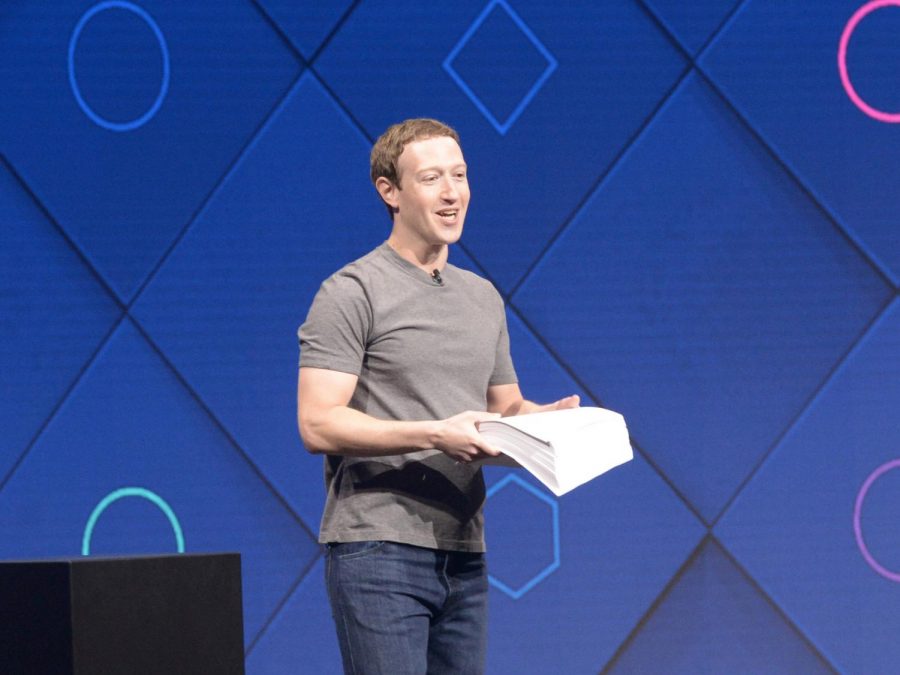Figuring out the future of Facebook
Opinion columnist Sam King discusses Facebook CEO Mark Zuckerberg’s recent promise to remove false news stories from the popular social networking site.
Feb 8, 2018
Practically everyone has a Facebook account. It’s the largest social media platform in the world, with 2.1 billion active users (Statista). Facebook is undeniably a giant in the industry, yet its future may be uncertain.
How could the most popular social media site in the world have a murky future? Well, that’s because Facebook announced a few days ago that, for the first time ever, the time spent on the platform has dropped.
That basically means Facebook users spent less time instead of more time on the website since it was created (Recode). While this may not sound like a big deal, it may be a telling sign of things to come.
It could also be nothing at all, however. Before I get into whether or not this dip is foreshadowing, let me explain why it happened.
Facebook is in a weird position right now. It’s both crazy popular and controversial.
Most recent news about Facebook has been about false news stories plaguing the platform (The Verge).
On the bright side, Mark Zuckerberg did promise to work on this issue and tackle it head on.
That’s a good thing since no one wants spam or fake news stories populating their feed. For the company itself, this will help improve their image at the cost of a lot of money. It’s also been argued, though, that these new measures may be backfiring on the company by worsening the problem (NY Times).
As of now, these measures have resulted in less people spending less time on Facebook, which is undoubtedly a bad thing for the company. No social media executive wants less time spent on their platform, but the recent updates Facebook implemented to combat spam and false news stories have actively reduced time spent on the site.
That’s both a good and a bad thing. It shows that Facebook is serious about combating spam at the expense of hurting their numbers. This mixed bag will end up confusing investors and perpetuating an unclear future.
Additionally, recent trends show younger generations are moving away from Facebook. Teenagers and young adults alike are distancing themselves from the platform as they embrace other social media like Instagram or Twitter (The Washington Post).
If you’re a college student or around my age, you likely grew up with Facebook and have a hard time remembering a world without it. If you’re also like me, you probably don’t use Facebook much.
Still, despite that foreboding drop in users and such a negative outlook for future generations, I don’t see Facebook going away anytime soon.
I rarely use Facebook, but I know it works well to organize events and communicate with friends and family. People my age likely recognize the same thing.
More importantly, my parents and older generations are heavy users of the platform. Of course, this is part of the reason why younger generations don’t like the site. It’s now perceived to be an “adult thing.”
A multi-billion-dollar business isn’t going to just fade away either. There are still 2.1 billion active users on the website. Sure, the numbers dropped by a small amount, but that doesn’t mean Facebook is sunk. They still have a lot of life left in them.
What I do think will happen is that Facebook may shrink in the future. Younger generations will move to the “cool” social media platforms, which will slowly shrink Facebook’s numbers. The website will likely maintain a large number of users, but maybe not 2.1 billion.
This is why I said Facebook had a murky future. I’m not sure what will happen. It’s unlikely that the site will disappear in the next 10 years, but it is possible.
Again, I think it will shrink in the future, but it’s possible that it will grow. To put it mildly, the future of Facebook is not certain.
The only certainty is that whatever happens to Facebook will end up affecting our society. Hate it or love it, social media is an integral part of our lives.
Facebook is currently the king of social media, but what happens if it gets cast off its throne? As of now, there’s no clear answer.
I personally hope for the best outcome, whatever that may be. I don’t use Facebook often, but it would be sad to see it die someday.
Of course, I doubt it’s going to vanish anytime soon, but it looks like we’ll just have to wait and see.








